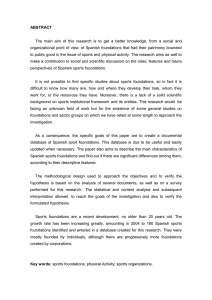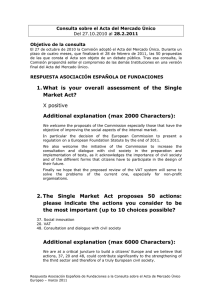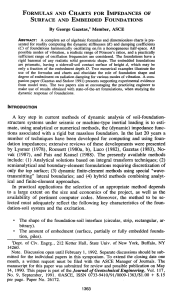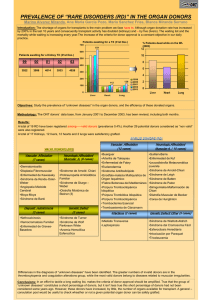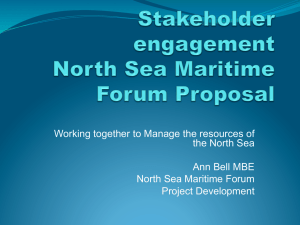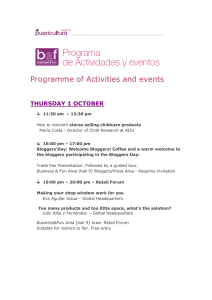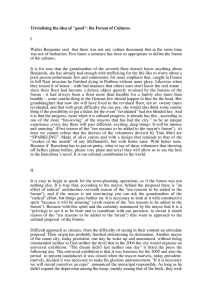EFC welcomes the adoption of the regulation on a European
Anuncio
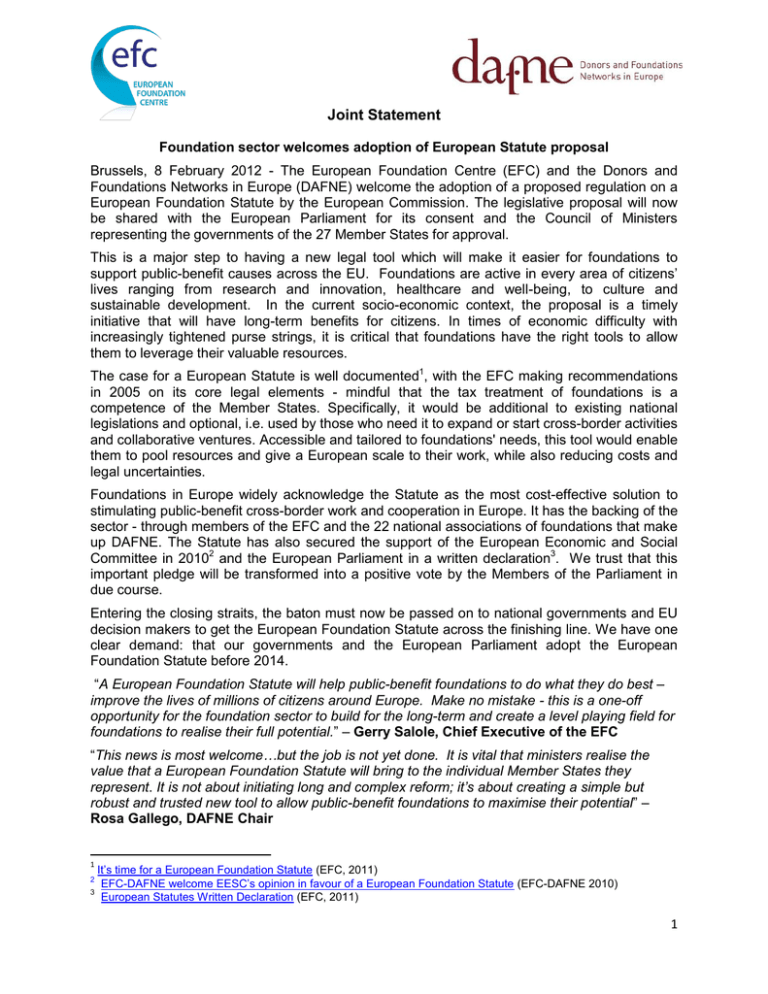
Joint Statement Foundation sector welcomes adoption of European Statute proposal Brussels, 8 February 2012 - The European Foundation Centre (EFC) and the Donors and Foundations Networks in Europe (DAFNE) welcome the adoption of a proposed regulation on a European Foundation Statute by the European Commission. The legislative proposal will now be shared with the European Parliament for its consent and the Council of Ministers representing the governments of the 27 Member States for approval. This is a major step to having a new legal tool which will make it easier for foundations to support public-benefit causes across the EU. Foundations are active in every area of citizens’ lives ranging from research and innovation, healthcare and well-being, to culture and sustainable development. In the current socio-economic context, the proposal is a timely initiative that will have long-term benefits for citizens. In times of economic difficulty with increasingly tightened purse strings, it is critical that foundations have the right tools to allow them to leverage their valuable resources. The case for a European Statute is well documented1, with the EFC making recommendations in 2005 on its core legal elements - mindful that the tax treatment of foundations is a competence of the Member States. Specifically, it would be additional to existing national legislations and optional, i.e. used by those who need it to expand or start cross-border activities and collaborative ventures. Accessible and tailored to foundations' needs, this tool would enable them to pool resources and give a European scale to their work, while also reducing costs and legal uncertainties. Foundations in Europe widely acknowledge the Statute as the most cost-effective solution to stimulating public-benefit cross-border work and cooperation in Europe. It has the backing of the sector - through members of the EFC and the 22 national associations of foundations that make up DAFNE. The Statute has also secured the support of the European Economic and Social Committee in 20102 and the European Parliament in a written declaration3. We trust that this important pledge will be transformed into a positive vote by the Members of the Parliament in due course. Entering the closing straits, the baton must now be passed on to national governments and EU decision makers to get the European Foundation Statute across the finishing line. We have one clear demand: that our governments and the European Parliament adopt the European Foundation Statute before 2014. “A European Foundation Statute will help public-benefit foundations to do what they do best – improve the lives of millions of citizens around Europe. Make no mistake - this is a one-off opportunity for the foundation sector to build for the long-term and create a level playing field for foundations to realise their full potential.” – Gerry Salole, Chief Executive of the EFC “This news is most welcome…but the job is not yet done. It is vital that ministers realise the value that a European Foundation Statute will bring to the individual Member States they represent. It is not about initiating long and complex reform; it’s about creating a simple but robust and trusted new tool to allow public-benefit foundations to maximise their potential” – Rosa Gallego, DAFNE Chair 1 It’s time for a European Foundation Statute (EFC, 2011) EFC-DAFNE welcome EESC’s opinion in favour of a European Foundation Statute (EFC-DAFNE 2010) 3 European Statutes Written Declaration (EFC, 2011) 2 1 Further information: - European Commission’s press release (IP/12/112) - Frequently asked questions about the Statute - EFC Statute webpage Contact details: Emmanuelle Faure (EFC) at [email protected], tel. +32.2.512.8938 Rosa Gallego (DAFNE) at [email protected], tel. +34.91.310.6309 About the EFC The EFC, founded in 1989, is an association of over 200 public-benefit foundations and corporate funders active in philanthropy in Europe and beyond. Our goal is to strengthen independent funding in European philanthropy using four key approaches. We foster a legal and fiscal environment where foundations can thrive. We analyse and recount what foundations are doing. We reinforce the philanthropic sector by setting standards and building capacity. And we promote collaboration among foundations and with other stakeholders, to advance the public good. All members back the EFC Principles of Good Practice, which reinforce good practice and transparency. www.efc.be About DAFNE DAFNE is a formal network bringing together 22 donors and foundations networks from across Europe. Each of these individually serves public benefit foundations and other grantmakers at national level. With a collective membership of over 6,000 foundations, DAFNE underpins the individual activities of its members by strengthening collaboration between the national associations and providing a platform for exchange of knowledge. The secretariat of DAFNE is hosted by the EFC. DAFNE networks are: Belgium: Network of Belgian Foundations Bulgaria: Bulgarian Donors Forum Czech Republic: Czech Donors Forum Finland: Council of Finnish Foundations France: Centre Français des Fondations Germany: Bundesverband Deutscher Stiftungen Hungary: Hungarian Donors Forum Ireland: Philanthropy Ireland Italy: Associazione di Fondazioni e di Casse di Risparmio (ACRI) the Netherlands: Vereniging van Fondsen in Nederland Norway: Stiftelsesforeningen Poland: Polish Donors Forum Portugal: Portuguese Foundation Centre Romania: Romanian Donors Forum Russia: Russia Donors Forum Slovak Republic: Slovak Donors Forum Spain: Asociación Española de Fundaciones Sweden: Föreningen Stiftelser i Samverkan Switzerland: Swiss Foundations Turkey: Third Sector Foundation of Turkey (TUSEV) UK: Association of Charitable Foundations Ukraine: Ukrainian Philanthropists Forum www.dafne_online.eu About foundations in Europe It is estimated that there are some 110,000 foundations in Europe, collectively spending between 83 and 150 billion euros annually on projects and programmes, and providing employment to up to one million Europeans. Foundations come in many shapes and sizes, with some offering grants while others prefer to operate their own programmes. In towns, cities, regions and countries across Europe, they can be found running or funding hospitals and universities; protecting historic buildings, promoting cultural activities, stimulating economic development and employment, supporting scientific excellence, advancing civil and human rights, engaging in environmental conservation, and much, much more. 2
